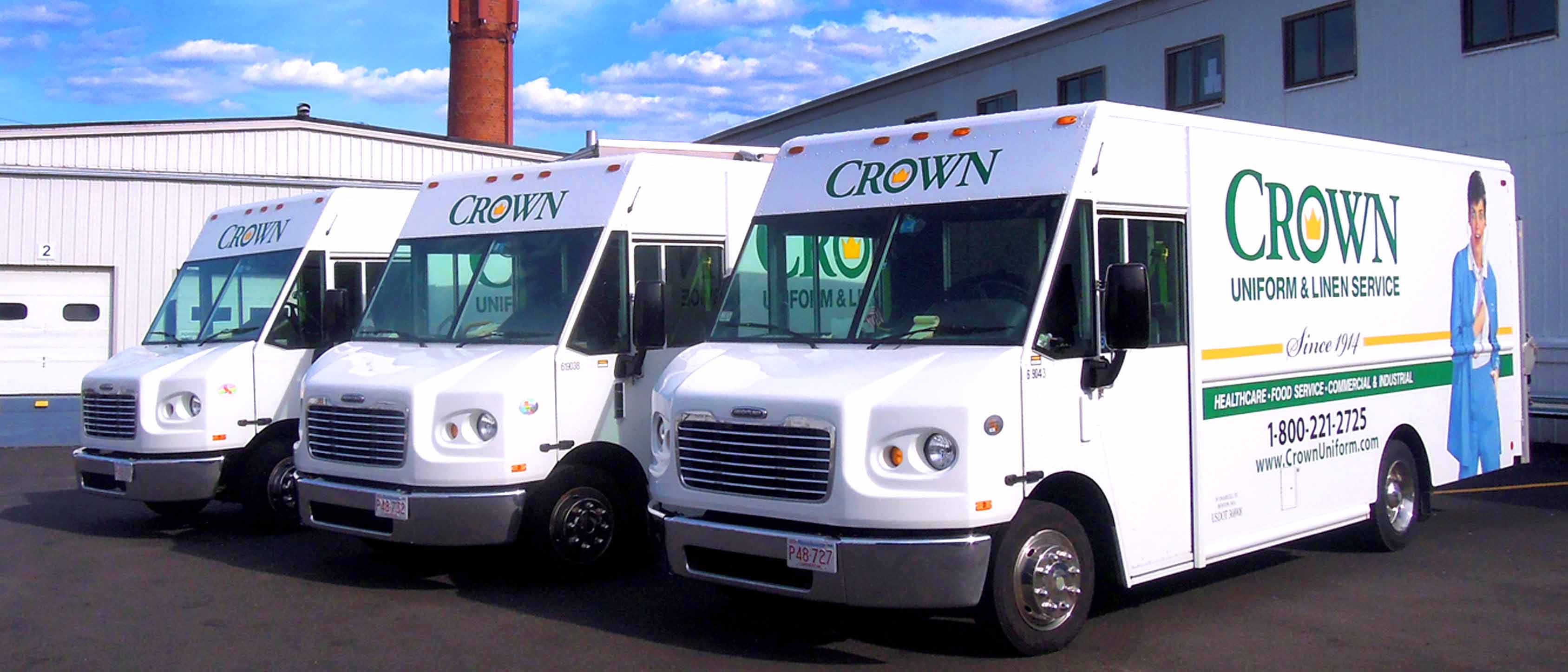
Crown Uniform and Linen Service: Anti-idling slashes fleet's fuel costs

Table of Contents
The challenge: Anti-idling program slashes fleet’s fuel costs
Crown’s fleet has reduced its daily idling time from 70 minutes per driver down to 7 minutes.
With each fleet vehicle making 30 to 40 stops per day, fuel costs add up for Crown Uniform & Linen Service, especially when fuel is wasted on unnecessary engine idling.
“Idling reduction has always been important to Crown, but the company has had limited success with idling programs in the past,” says Dave Hardy, Crown’s fleet supervisor. “Earlier this year, we really wanted to try it again.”
Founded in Boston in 1914, this family owned, fourth generation uniform and linen supplier delivers and picks up at various businesses (i.e., health care, food service) on a weekly basis. With five locations in Massachusetts, New Hampshire, Connecticut and Virginia, its 30 Freightliner MT45 step vans — leased through local Ryder and Penske truck dealerships — travel approximately 100 to 150 miles daily throughout New England, according to Hardy.
Partnering with Sustainable America, Crown was able to roll out an idling reduction pilot program last March. Sustainable America — an environmental nonprofit organization that promotes sustainability initiatives, including reducing oil consumption — provided Crown with ideas and tips through its “IdleFree Fleet Program.” According to Sustainable America, 3.8 million gallons of fuel is wasted by idling in the U.S. every day.
The solution
How to implement
Once the vision was identified with Sustainable America’s help, Hardy started tracking each step van’s idling time with Geotab’s telematics software. Installed in each step van, the Geotab device tracks a vehicle’s location, mileage, maintenance as well as idling (every time the engine stops and starts).
“I went back over several months and calculated our current idling baseline” says Hardy. “I found out we were idling for 70 minutes per driver per day. I noticed that many drivers were idling as much as two to five hours per day on their route. ”
The next step was communicating with location managers. After pointing out the high idling times, most of the managers had no idea their drivers were idling and for how long per day, according to Hardy.
Many of the drivers would leave the engine running out of habit. “Some drivers left their vehicles running while making a delivery,” says Hardy. “We had drivers idling while fueling their vehicle, going through a car wash and waiting at security gates.”
Once he got the managers on board with the program, they filtered the information down to their drivers to train them and eliminate these bad habits. Hardy set a goal of 10 minutes of idling per route per day.
After calculating the idling baseline, identifying common reasons for idling and setting a new idling limit, Hardy developed a daily tracking and reporting system. “I created a daily report that I sent out to managers that said how long each vehicle had been idling. I would say which drivers idled over 10 minutes and point out specific stops and problem areas.”
Then each manager would speak to the drivers individually and correct their actions. The daily communication helped to retrain drivers on the importance of shutting off the vehicle engine between stops, according to Hardy.
The results
Benefits of program
Within a few months, Crown’s drivers went from 70 idling minutes per day down to 7 minutes, says Hardy. With this decrease in idling times, “We have seen savings in fuel between $1,500 and $2,000 per month,” says Hardy.
With the program’s success among its delivery drivers, Crown plans to extend the program to its sales team, which drives about 15,000 to 20,000 miles per vehicle per year.
From the fleet manager
“We have developed a culture of anti-idling at Crown.”
- Dave Hardy, Crown’s fleet supervisor
Client profile
Client name:
Crown Uniform and Linen Service
Industry:
Uniform Supplier
Types of vehicles:
Freightliner Step Vans
Fleet size:
30
Fleet focus:
Fleet Optimization, Productivity
Other stories

Brown Dog Carriers reduces idling time and simplifies compliance
December 4, 2024

City of Port Colborne enhances fleet safety and efficiency with Geotab, saving over 500 tons of salt
November 28, 2024

The City of Henderson unlocks fleet efficiency with telematics
October 28, 2024

Northern Logistics: Boosting driver performance by 28% with Geotab
October 24, 2024





